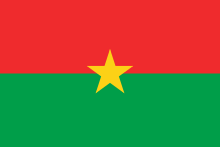
Burkina Faso is a landlocked country in West Africa. It covers an area of 274,223 km2 (105,878 sq mi), bordered by Mali to the northwest, Niger to the northeast, Benin to the southeast, Togo and Ghana to the south, and Ivory Coast to the southwest. As of 2021, the country had an estimated population of 23,674,480. Previously called Republic of Upper Volta (1958–1984), it was renamed Burkina Faso by President Thomas Sankara. Its citizens are known as Burkinabè, and its capital and largest city is Ouagadougou.

Burkina Faso has good relations with the European Union, African and certain Asian countries. France, the former colonial power, in particular, continues to provide significant aid and supports Compaoré's developing role as a regional powerbroker.

The national flag of Burkina Faso is formed by two equal horizontal bands of red (top) and green, with a yellow five-pointed star resting in the center. The flag was adopted on 4 August 1984. The flag uses the Pan-African colours of Ethiopia, reflecting both a break with the country's colonial past and its unity with other African ex-colonies. The red is also said to symbolize the revolution and the green the abundance of agricultural and natural riches. The yellow star placed over the red and green stripes represents the guiding light of the revolution. The flag was adopted following the coup of 1983 which brought Thomas Sankara to power.

Thomas Isidore Noël Sankara was a Burkinabè military officer, Marxist revolutionary and Pan-Africanist who served as President of Burkina Faso from his coup in 1983 to his assassination in 1987. He is viewed by supporters as a charismatic and iconic figure of the revolution, and a powerful advocate for Pan-Africanism, and workers rights, while his critics condemn his human rights abuses and the authoritarian government he led.

Blaise Compaoré is a Burkinabé-Ivorian former politician who served as the second president of Burkina Faso from 1987 to 2014. He was a close associate of the first president, Thomas Sankara, during the 1980s and in October 1987 he led a coup d'état during which Sankara was killed. Subsequently, he introduced a policy of 'rectification', overturning the leftist and Third Worldist policies pursued by Sankara. He won elections in 1991, 1998, 2005, and 2010, in what were considered unfair circumstances. His attempt to amend the constitution to extend his 27-year term caused the 2014 Burkinabé uprising. On 31 October 2014, Compaoré resigned, whereupon he fled to the Ivory Coast. In April 2022, he was found guilty by a special military tribunal of complicity in Sankara’s murder. He is also the longest-serving president of Burkina Faso.
This is a list of holidays in Burkina Faso.

The Burkina Faso national football team represents Burkina Faso in men's international football and is controlled by the Burkinabé Football Federation. They were known as the Upper Volta national football team until 1984, when Upper Volta became Burkina Faso. They finished fourth in the 1998 Africa Cup of Nations, when they hosted the tournament. Their best ever finish in the tournament was the 2013 edition, reaching the final.

Christianity is a minority religion in Burkina Faso.

Burkina Faso–Russia relations are the bilateral relations between the two countries, Burkina Faso and Russia. Russia is accredited to Burkina Faso from its embassy in Abidjan. In July 2023, the embassy of Russia re-opened.

Visitors to Burkina Faso must obtain a visa from one of the Burkina Faso diplomatic missions unless they come from one of the visa exempt countries or a country whose citizens may obtain a visa on arrival.

Burkina Faso–China relations refer to the diplomatic interactions between Burkina Faso and the People's Republic of China (PRC). Both nations maintain embassies in each other's capitals, Beijing and Ouagadougou, respectively.

Cannabis in Burkina Faso is illegal. Burkina Faso's tropical environment makes it perfect for cannabis growth. However, cannabis rates among adolescents are low, as most cannabis grown in Burkina Faso is exported to countries where cannibis cultivation is hindered by climate or legality.
The COVID-19 pandemic in Burkina Faso was a part of the ongoing worldwide pandemic of coronavirus disease 2019 caused by severe acute respiratory syndrome coronavirus 2. The virus was confirmed to have reached Burkina Faso on 9 March 2020. The death of Rose Marie Compaoré, a member of the National Assembly of Burkina Faso, on 18 March marked the first recorded fatality due to COVID-19 in Sub-Saharan Africa.

An ongoing war and civil conflict between the Government of Burkina Faso and Islamist rebels began in August 2015 and has led to the displacement of over 2 million people and the deaths of at least 10,000 civilians and combatants.

An Islamist insurgency has been ongoing in the Sahel region of West Africa since the 2011 Arab Spring. In particular, the intensive conflict in the three countries of Mali, Niger and Burkina Faso has been referred to as the Sahel War.

A coup d'état took place in Burkina Faso on 30 September 2022, removing Interim President Paul-Henri Sandaogo Damiba over his alleged inability to deal with the country's Islamist insurgency. Damiba had come to power in a coup d'état eight months earlier. Captain Ibrahim Traoré took over as interim leader.

Ibrahim Traoré is a Burkinabè military officer who has been the interim leader of Burkina Faso since the 30 September 2022 coup d'état that ousted interim president Paul-Henri Sandaogo Damiba. At age 36, Traoré is currently the second youngest serving state leader in the world, and the youngest serving president.
On August 4, 2022, jihadist militants ambushed a counter-terrorism operation organized by the Burkina Faso Armed Forces, killing four civilians and nine VDP militiamen. The Burkinabe government claimed that thirty-four insurgents were killed immediately after the attack.













